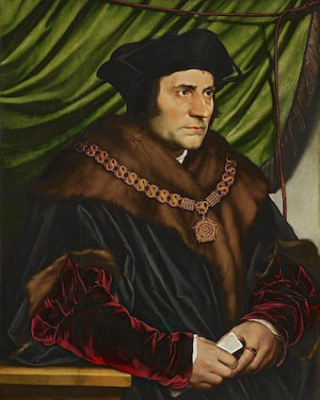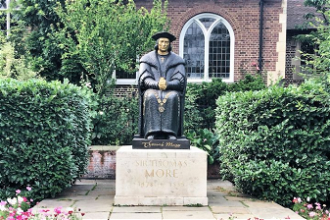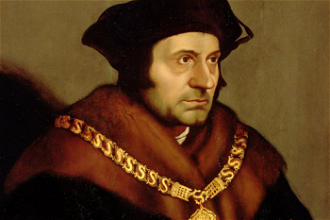Reflection: St Thomas More, Refugees and Shakespeare

Sir Thomas More - Hans Holbein, the Younger - Google Art Project
Heather Kiernan writes on the Feast Day of St Thomas More...
Having celebrated World Refugee Day last Sunday, I am reminded that six hundred years ago a feverish xenophobia swept through the country as 64,000 foreigners, from wealthy Lombard bankers to Flemish labourers, arrived on English shores in search of better lives. Locals blamed them for taking their jobs and distorting their culture.
Tensions reached a zenith on May 1, 1517, as riots broke out in London and a mob armed with stones, bricks, bats, boots and boiling water attacked the immigrants and looted their homes. Thomas More, then the city's deputy sheriff, tried to reason with the crowd.
This dark day in history, known as Evil May Day, was portrayed in a then-banned play called 'The Book of Sir Thomas More', believed to be written between 1596 and 1601.
William Shakespeare and two other writers were called to edit the manuscript, with Shakespeare contributing the 147 lines of More's emphatic pro-immigrant monologue. The play was never performed in Shakespeare's lifetime because the Queen's censor thought it might incite riots, during a time when England was once again besieged by another immigrant crisis with the arrival of French-speaking Protestant asylum seekers from France, Belgium and the Netherlands. More's call for empathy, has since become a clarion call for refugee advocates today.
The text begins with More's response to the mob:
The Book of Sir Thomas More, Act 2, Scene 4
Grant them removed, and grant that this your noise
Hath chid down all the majesty of England;
Imagine that you see the wretched strangers,
Their babies at their backs and their poor luggage,
Plodding to the ports and coasts for transportation,
And that you sit as kings in your desires,
Authority quite silent by your brawl,
And you in ruff of your opinions clothed;
What had you got? I'll tell you: you had taught
How insolence and strong hand should prevail,
How order should be quelled; and by this pattern
Not one of you should live an aged man,
For other ruffians, as their fancies wrought,
With self same hand, self reasons, and self right,
Would shark on you, and men like ravenous fishes
Would feed on one another….
Say now the king
Should so much come too short of your great trespass
As but to banish you, whither would you go?
What country, by the nature of your error,
Should give you harbour? go you to France or Flanders,
To any German province, to Spain or Portugal,
Nay, any where that not adheres to England,
Why, you must needs be strangers: would you be pleased
To find a nation of such barbarous temper,
That, breaking out in hideous violence,
Would not afford you an abode on earth,
Whet their detested knives against your throats,
Spurn you like dogs, and like as if that God
Owed not nor made not you, nor that the claimants
Were not all appropriate to your comforts,
But chartered unto them, what would you think
To be thus used? this is the strangers case;
And this your mountainish inhumanity.
See also: ICN Saint of the Day - 22 June - St Thomas More and St John Fisher - www.indcatholicnews.com/saint/184

















